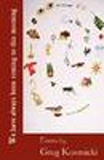Review by Karen Weyant
Lewis-Clark Press/Sandhills Press
ISBN 978-0-911015-57-7
2007, 112 pp., $15.00
www.amazon.com
Near the beginning of Greg Kosmicki’s We have always been coming to this morning, he addresses his audience with “My Flag,” a poem that doubles as an invocation. He opens his work with a simple narrative gesture: “It is after dinner and I go to shake/the crumbs from the tablecloth./They fall down the porch steps/for the crickets and the mice and the ants”–yet soon, we see the speaker liken the tablecloth to the American flag, “the flag of the friendly country/where even the vermin have enough to eat.” The poem ends with an invitation: “I want you to spill your wine./I want you to get bread crumbs on my flag.”
And where is this invitation, to, exactly? With a first reading of this book, the answer might not be clear. Certainly, Kosmicki’s world is a world of complex characters, histories, and situations. But it is also a world of absurdities. This is not to say that his poems are absurd. No, quite the opposite. In fact, in this newest collection from Kosmicki, we find a poet searching to capture the true essence of life by balancing everyday beauty and pure insanity.
In many poems, Kosmicki steps outside the personal narrative to record the voices of others. For instance, in the short and concise work, “Poem an Old Drunk Street Poet Told My Son at the Greyhound Station” (the title is almost as long as the poem itself), the speaker relays words to live by through another’s voice:
He sees the evil
the people who live there do
but pisses on no one.
Certainly, this poem could be seen as a motto for the entire collection, because in many of his works Kosmicki reports, but doesn’t pass judgment. For instance, in “Sacrifice,” the speaker celebrates a man who lived the “life he knew” — a life that encompassed “sleeping in the park/eating out of the trash.” And in “Mailing Out Poems in Benson” a poet records an act of violence:
Mom stomps around the van
from the driver’s side
curses all the way
to slam the door so hard
it could have crushed the girl’s arm in two
and I bet then in a poem
her arm would have broken off like a wing.
However, it’s the more personal poems that truly strike a nerve. For example, in “Skunk Beer” the speaker, while purchasing a six pack, records a memory of buying Pabst when he was younger, “to dull the pain of whatever it was/each one of us knew had to be dulled/but never could explain.” In “Agent Orange” the persona mourns a past friend who “took care of me/drunk slobbering about my dead brother.” And in “I awaken in a group home for the mentally handicapped,” the speaker seemingly finds both religion and reality in the face of a patient who screams “obscenities in my face” and throws “himself to the floor.”
Certainly, many of Kosmicki’s poems are somber in both tone and subject, but I believe that the majority of his works celebrate the daily ordinaries of life, whether they are victories or challenges. In “Peanut Butter,” the speaker sits with his daughter and contemplates “the miracle” of their quiet time with “a jar of Supper Crunch Skippy/and a knife, and smeared/peanut butter all over the bread.”
While domestic life is a big theme in this collection, nature sometimes takes center stage. “The Dandelion”, for instance, is a sort of ode, a work that celebrates a weed “so tough, the only way to get rid of it/is to poison it heavily/or to get a shovel and dig it out.” However, the poem then goes on to mention that the speaker “looked until I found a woman to marry/who loved dandelions as much as I do.” Another poem, “Migration,” celebrates flying geese by explaining “I read somewhere once about the mechanics of the “V”/how the lead goose takes the brunt of the wind.” Then there’s “Cricket Redux” where the speaker tells us, “They are great singers, those/crickets. They are one great song, one great song of the earth.” Finally, the tiny nondescript little sparrow gets star treatment in “Why I Watch Sparrows,” where Kosmicki relays a list poem that celebrates sparrows’ endurance, especially with these ending lines:
because they think for themselves
because so many other birds are gone from our lives.
because the frogs and toads are disappearing
because they have not ceased to be
because they live wrapped up in the meaning of their lives
because they have witnessed
everything.
Can the angry be sympathetic? Can the grotesque be loveable? Can the lost be found? Can the ordinary be seen as something extraordinary? These are the somewhat clichéd questions that Kosmicki explores. But a reader will find anything but clichés in his answers. Instead, the earnest questions he poses, no matter how bizarre, funny or frightening, always have the answer yes.